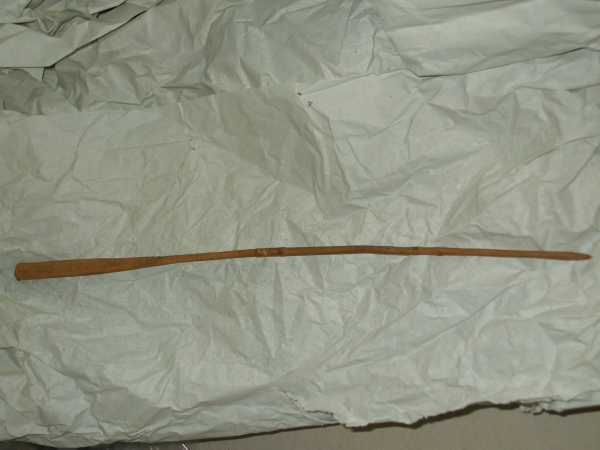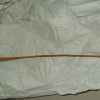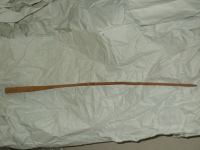arrow
arrow
arrow


A wooden arrow, collected in 1823 from Wisconsin by G.C. Beltrami. In this period, the four main nations in this region were the Ho-Chunk (Winnebago), Menominee, Anishinaabe, and Potawatomi. Around 1856, Beltrami's nephew donated several objects, including this one, to the Civic Library of Bergamo. Later the collection was transferred to the Museo Civico di Scienze Naturali, its current location.
According to Tanner (1987), "The Wisconsin region, a part of Michigan Territory in 1830, retained its characteristic population of four major Indian tribes, Winnebago [Ho-Chunk], Menominee, Ojibwa [Anishinaabe], and Potawatomi, as well as a small number of French and Métis." (p.143)
Museum documentation and secondary sources.
Read More About This Relative
wood
Carved from a piece of wood.
Provenance
Collected by G.C. Beltrami from Wisconsin in 1823. Beltrami's collection catalogue states that around 1856, Beltrami's nephew donated several objects to the Civic Library of Bergamo, and later transferred to the Museo Civico di Scienze Naturali.
The Beltrami Collection was exhibited in Florence in 1929 during the "Prima Esposizione Nazionale di Storia delle Scienze" (First National Exposition of History of Sciences"). In 1973, during a celebration of the Beltrami exhibit, Glauco Luchetti donated three objects from his own collection, which were located in Beltrami's last house in Filottrano, to the "Museo Civico E. Caffi". In 1987 the collection was used in the exhibit entitled "Missisippi 1823. Oggetti indiani raccolti da G. Costantino Beltrami" in the Galleria Lorenzelli in Bergamo.
Leonardo Vigorelli, Gli Oggetti indiani raccolti da G.Costantino Beltrami, Civico Museo E. Caffi, Bergamo, 1987.
Tanner, H. H. "Indian Villages c.1830: Wisconsin Region of Michigan Territory," Atlas of Great Lakes Indian History (Norman: University of Oklahoma Press, 1987): 143-6.
About This GRASAC Record
This record was first created by Emanuela Rossi after a trip funded by GRASAC to the Museo Civico E. Caffi in Bergamo, Italy in October 2008.
Researchers present: Emanuela Rossi
44.16098, -91.78108
According to museum documentation, the item was collected by Beltrami in Wisconsin.
In the Beltrami s Collection Catalogue, the author, Leonardo Vigorelli, defines "Upper Mississippi" as the Cultural Area of Origin. He defines "Northeast" as the Geographic Area.
 Knowledge Sharing Platform
Knowledge Sharing Platform

